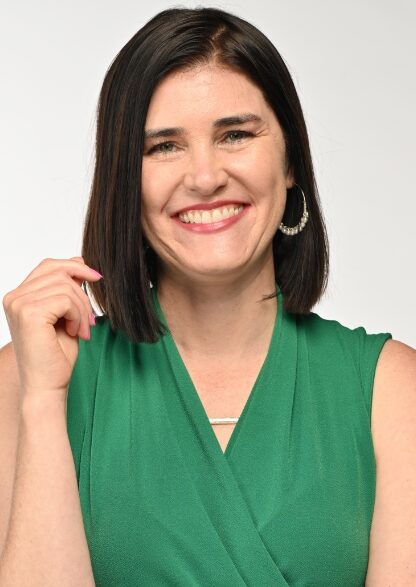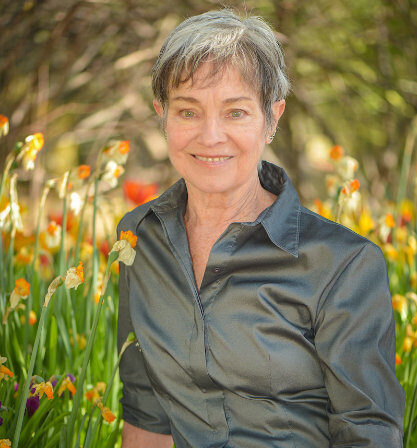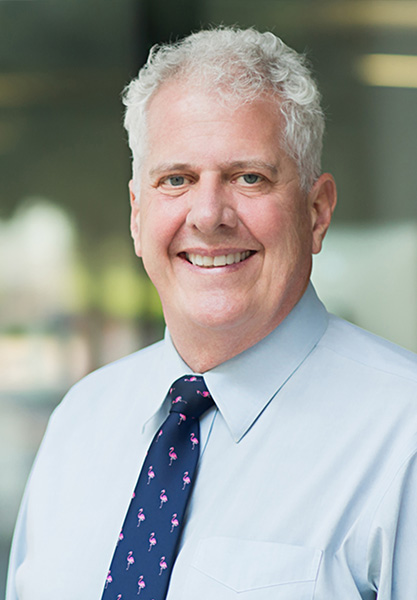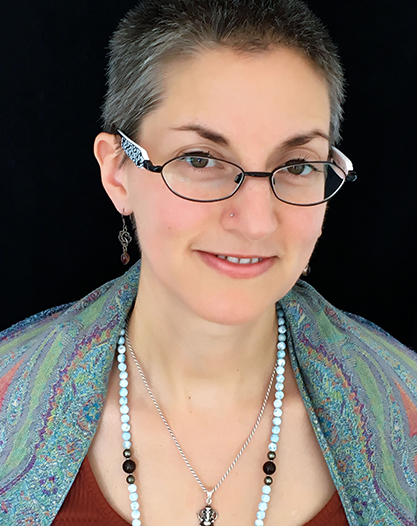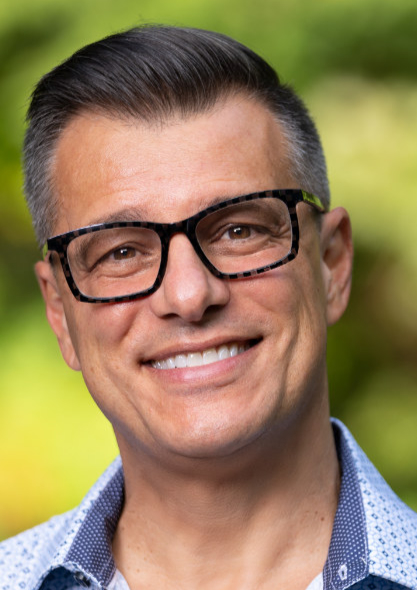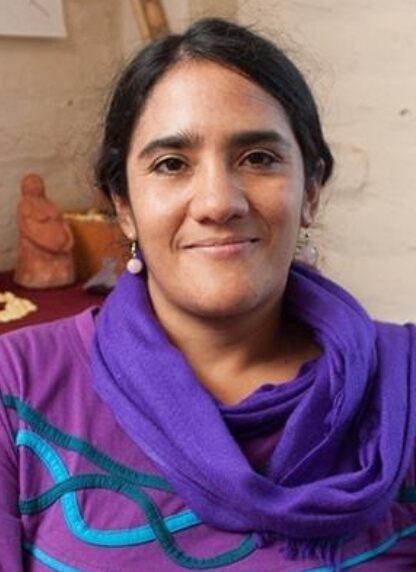
Summer Sale Bundle
We’re sorry — the Summer Sale Bundle was available until July 28, 2025.
Purchasing is no longer possible at this time.

What is Our Summer Sale Bundle?
For the first time ever, all 20 of our most popular IFS Therapy workshops are available together in the Summer Sale Bundle.
💰 Save over 80% — and start learning today!
Summer Sale Bundle includes:
- Transcending Trauma – Frank Anderson
- Somatic IFS – Susan McConnell
- IFS in Group Settings – Mary Kruger
- IFS & Psychedelics – Bob Falconer, Richard Schwartz, Robert M. Grant & Michael Mithoefer
- IFS Therapy: Therapeutic Relationship & Power of Presence – Paul Neustadt
- IFS is Grief Work: Healing Unattended Losses – Jory Agate
- Working With Highly Conflictual Couples – Mary Kruger
- Befriending Difficult Protectors – Mike Elkin
- IFS Therapy: A Spiritual and Energetic Approach – Kay Gardner
- Direct Access – An Essential IFS Skill – Fran Booth
- Effective Compassion: IFS Interventions for Healing Trauma and Addictive Cycles – Cece Sykes
- Self-led Sexuality – Patricia Rich
- The Others Within Us: Unattached Burdens and Guides in IFS Therapy – Bob Falconer
- Shamanism & Psychotherapy – Robert Falconer & Ann Sinko
- IFS and the Polyvagal Theory: Healing Through Compassion and Connection – Alexia Rothman
- The Gifts of Our Exiles in IFS – Paul Neustadt
- Daily Parts Meditation Practice for Therapists – Michelle Glass
- Healing Through Generations: Ancient Wisdom, Ancestral Healing and IFS Therapy – Daphne Fatter, Monique Lang & Tatiana Dávila
- Safe Practices for Working with Plant Teachers – Geke Dijkstra
- Somatic Parts Work – LaDonna Silva
These are in-depth, on-demand workshops—each focused on a key topic in IFS Therapy and led by experienced trainers. Enjoy instant access and learn whenever it suits you.
Unlock lifetime access for a one-time payment of 💸 $997 (instead of $5310) — save over $4313 and enjoy more than 80% off our full collection of expert-led workshops!
You’ll also receive certificates for each workshop — making this not only an inspiring learning experience, but a meaningful investment. For those who’ve completed Level 1 training, IFS CE credits can also be applied toward certification.
Meet the teachers you’ll learn from this summer:
See what others have gained from our previous workshops:
Full List of Workshops Included in the Summer Sale Bundle:

Transcending Trauma
Working with clients who suffer from complex PTSD can often feel like being on a roller coaster. The extreme reactions, multiple comorbidities, difficulty with boundary issues and volatility in relationships make these clients challenging even for the most skilled therapists.
During the “Transcending Trauma” workshop series we will dive deep into ideas Frank Anderson described in his newest book “Transcending Trauma”, which explores a unique, compassionate, and evidence-based approach to resolving complex and dissociative trauma.
During “Transcending Trauma” you will:
- Learn how to incorporate IFS with other models of treatment.
- Gain awareness of how to address protective parts in a trauma-specific manner.
- Discover the various forms of healing associated with complex PTSD and dissociation.
- Incorporate neuroscience knowledge as it relates to the IFS model.

Somatic IFS
The unity of body and mind is more than a concept. It is a lived experience that transforms us and the culture as a whole. Our internal families are embodied, including the parts that block our access to our Embodied Self.
In this workshop, you will experience each of the five practices of Somatic IFS — awareness, breath, resonance movement, and touch.
During “Somatic IFS” you will:
- Experience the five practices of Somatic IFS (awareness, breath, resonance, movement, and touch).
- Understand how protector parts may fear and resist embodiment due to individual, cultural, ethnic, ancestral, and transgenerational burdens.
- Understand how exiles use the body to tell their stories through sensation and movement.
- Discover how these Somatic Practices integrate with the IFS Model to access parts of the internal system and facilitate unburdening, restoring Embodied Self Energy.
- Understand how embodying the internal system, including Self, is crucial for addressing interpersonal, intergenerational, and collective trauma.

IFS in Group Settings
Group therapy offers a unique and powerful avenue for healing. Incorporating IFS into group therapy not only enriches the therapeutic process but also creates a collaborative healing space that fosters deep self-exploration and connection.
This workshop provides an engaging overview of group work from a systemic perspective, seamlessly integrating IFS principles to enhance your clinical practice. You’ll gain valuable insights and practical skills that will empower you to bring IFS into your group sessions with confidence and creativity, enriching the therapeutic journey for both you and your clients.
During “IFS in Group Settings” you will learn:
- The healing benefits of Group Work – why it makes sense to work in groups.
- How to create and maintain trust and safety within the group setting.
- How to work with entrenched protective parts/strategies, such as addictive behaviors and disordered eating.
- Practical applications of the material in a group setting, including usable exercises.
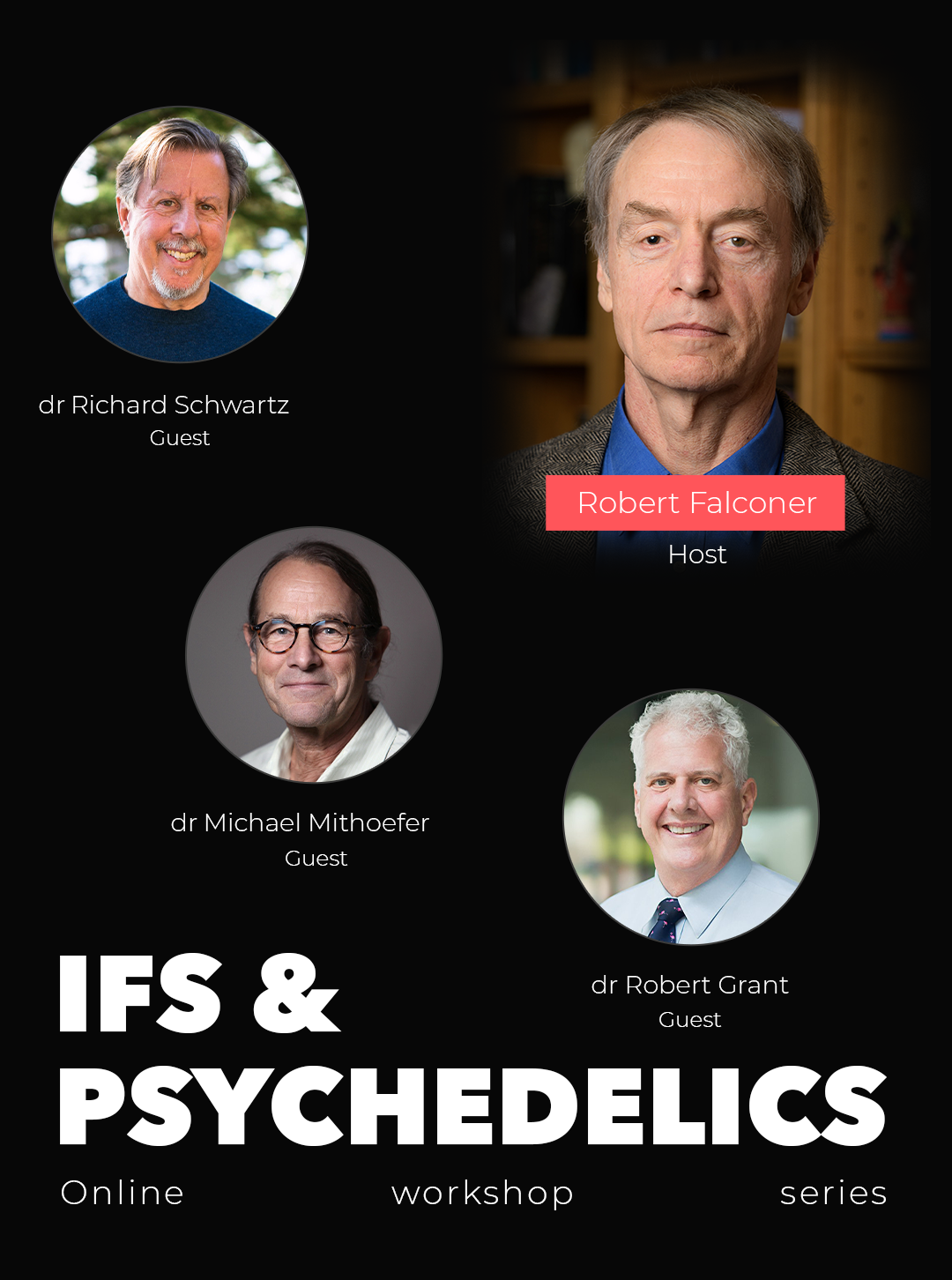
IFS & Psychedelics
The demand for both IFS therapy and psychedelic-assisted therapy has exploded in recent years. It doesn’t come as a surprise – both modalities are powerful on their own. When combined, the potential for relieving human suffering is immense. We believe that IFS therapy is a great fit with psychedelics and there are many reasons for that.
For starters, psychedelic-assisted therapy is still a new and growing field. All the information that can be found in books and courses is presented in the spirit of general guidelines and not as settled answers. Therapists and practitioners are in a need of a solid framework that will help them do this work.
During “IFS & Psychedelics” you will:
- Discover an IFS view of the psychedelic-assisted therapy process, along with an outline of an IFS assisted psychedelic session.
- Learn about the application of IFS therapy during three stages of work with psychedelics – preparation, experience, and integration.
- Go through a review of major research about psychedelic therapy.

IFS Therapy: Therapeutic Relationship & Power of Presence
During this workshop with Paul Neustadt, we will explore how you can use the therapeutic relationship to facilitate the client’s healing from a part’s perspective.
We will dive deeply into all the essential building blocks constituting the quality of therapeutic relationships, from presence and attunement to the role of the therapist system, common obstacles and challenges, spiritual empowerment, and specific, context-sensitive strategies and solutions.
During “IFS Therapy: Therapeutic Relationship & Power of Presence” you will:
- How the quality of our presence and attunement impacts the energy field we create with our clients.
- How to be aware of our own inner experience and our degree of presence while we are listening to our clients.
- How to work with our parts that interfere with our ability to be present; parts that are attached to an outcome; that feel a need for the client to change, etc.
- The value as well as the challenges of being authentic, transparent, and human as an IFS therapist.
- How to transform parts triggered by our clients to access their wisdom about us and our clients.

IFS is Grief Work: Healing Unattended Losses
Throughout our lives, we experience loss, pain, and trauma, and often these experiences are linked with not feeling emotionally supported. Our systems long to process and integrate grief. However, processing grief can be feared: Will I be lost in it? Will the feeling be overwhelming? Internal and external systems may offer avoidance, minimization, or distraction. We hear: “Get over it”, “Don’t dwell on it”, “Look on the bright side” etc.
As clinicians, we risk colluding with these parts or parts that want to move quickly through or avoid the pain. This workshop offers techniques to gently guide your clients through the grief process, fostering genuine healing without rushing or bypassing the depth of their experience.
During “IFS is Grief Work: Healing Unattended Losses” you will:
- Explore the application of the IFS model to grieve these unattended losses.
- Discover how to identify and work with protectors that avoid, rush, minimize, distract, etc. from the grief.
- Discuss allowing exiles to stay with grief to deepen healing and integration.

Working with highly conflictual couples
Armed with fierce protectors who keep the shame, hurt, rejection and loneliness of exiles well hidden from both the clients and the therapist.
Clients, therapist and the therapy remain stuck as parts engage in extreme protective roles and a series of repetitive patterns of behavior that have a positive intent, but are actually causing harm. In this workshop, IFS will bring a new perspective to working with such challenging couples.
During “Working with highly conflictual couples” you will:
- Understand the definition of a high conflict couple and the patterns of interaction that keep them stuck.
- Learn how and why couples’ parts attract to each other, and how to identify, track, and map these interactions in sessions.
- Discover how to create safety and structure during therapy, helping clients un-blend from their parts and negotiate with protectors to “put down the weapons.”
- Explore the impact of trauma, addictions, eating disorders, infidelity, and stepfamily issues on parts and relationships—and approaches for healing shame, betrayal, and hurt.
- Recognize the impact of the therapist’s own parts on couples therapy, and how to stay self-led and avoid polarization.

Befriending Difficult Protectors
The key skill set of the IFS therapist is the ability to enlist the protective system as allies in their therapeutic project. This is complicated by the fact that protective parts by definition have been forced into extreme roles, and so are very likely to have a radically distorted understanding of your client’s best interests.
This workshop is designed to help IFS therapists and practitioners at a variety of skill levels discover and address the fears and concerns of mistrustful protectors, and help them become resources in healing.
During “Befriending Difficult Protectors” you will learn how to:
- Negotiate a valid therapeutic contact with your client’s myriad parts,
- Detect and successfully address the concerns of your clients protective parts,
- Maintain Self Energy in the face of fearful protectors, and recruit them as allies in your therapeutic project.

IFS Therapy: A Spiritual
and Energetic Approach
Imagining energy is a leap of faith made by shamans, mystics, and energy workers, but ironically so to the physicists who tell us all life is energy involving tiny invisible particles in constant motion.
It is a world that is not static and thing-like but fluid and in constant motion, where labels and diagnoses stultify the ebb, flow, and vitality of life. A world that can be experienced and not seen. A world of shadow and mystery but also awe, wonder, hope, and spirituality, allowing us to imagine something bigger than us or even the oneness of all life.
During “IFS Therapy: A Spiritual and Energetic Approach” you will learn how to:
- Negotiate a valid therapeutic contact with your client’s myriad parts.
- Detect and successfully address the concerns of your clients protective parts.
- Maintain Self Energy in the face of fearful protectors, and recruit them as allies in your therapeutic project.

Direct Access – an essential IFS skill
Having mastered the basic IFS protocol, the maturing IFS therapist often seeks proficiency with Direct Access. Embodied ease with Direct Access increases your competence as an IFS therapist. This workshop will include didactic, video demonstrations, experientials, and practice.
You will leave this workshop with more confidence and clarity using Direct Access.
During “Direct Access – an essential IFS skill” you will:
- Identify and unblend therapist parts that block using Direct Access.
- Be able to define the difference between explicit and implicit Direct Access.
- View video examples of explicit and implicit Direct Access to deepen learning.
- Leave with increased clarity in using direct access with protectors.
- Begin to master the particular skill of addressing protector fears: how to “hear” the particular fear, and how to respond.
- Deepen your understanding of the use of Direct Access with exiles, critics, and heavily burdened systems.
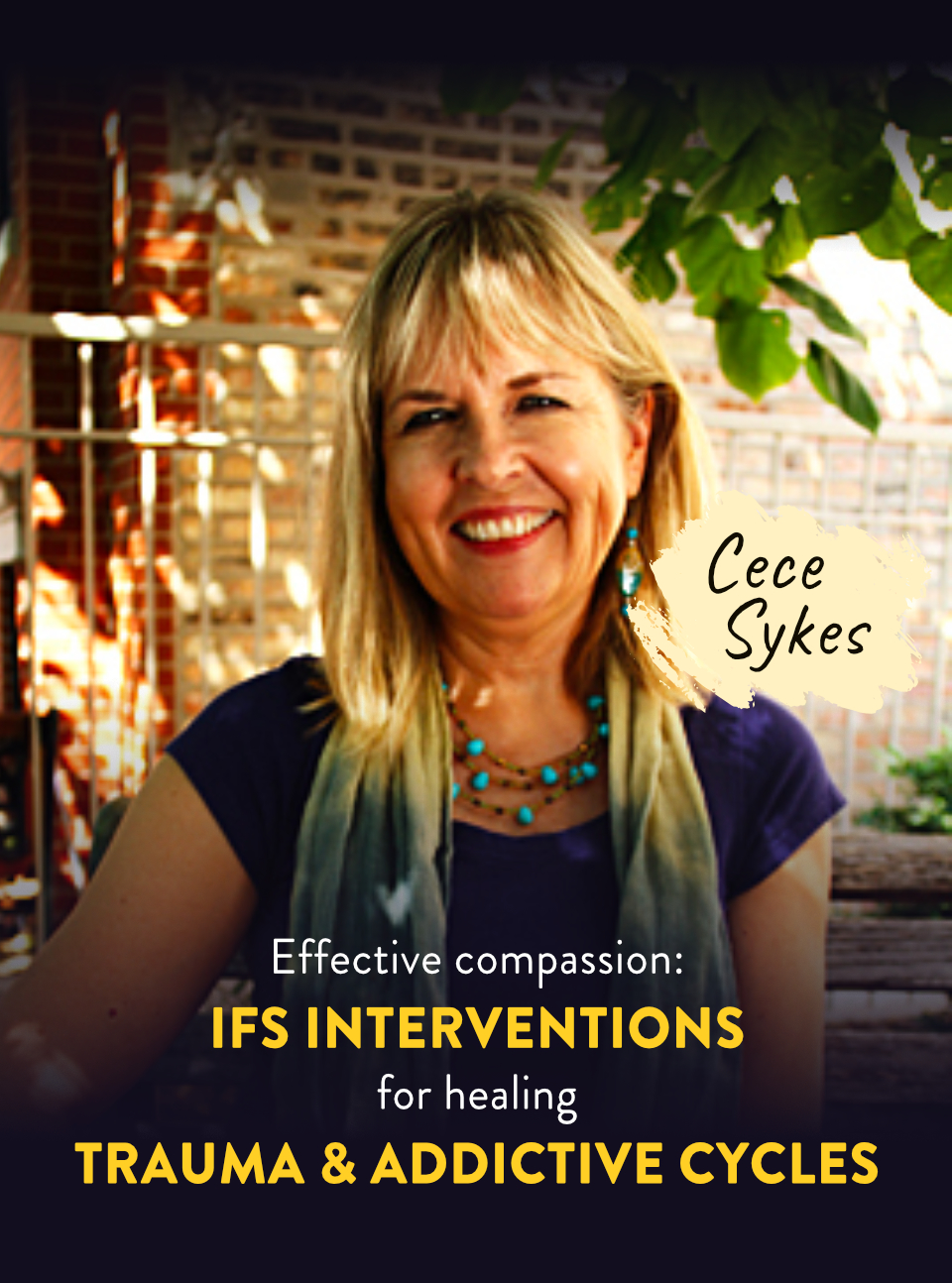
IFS Interventions for Healing Trauma and Addictive Cycles
Feeling ‘addicted’ to social media, crime shows, overworking, overspending or nightly sweets, cannabis or drinks are common complaints. Stress escalates when clients find out they can’t quit – what does this mean? Other clients engage in behaviors that are more compulsive, suffering from heavy drinking/drug use, disordered eating, gambling or sexually compulsive activity.
Some end one behavior only to ‘trade addictions’ and find another. This workshop offers a helpful, clear paradigm shift that clinically addresses these stressful issues and offers clear compassionate interventions.
During “IFS Interventions for Healing Trauma and Addictive Cycles” you will:
- Be able to identify and track addictive processes and how they are maintained in the system.
- Learn safe interventions for identifying and working with addictive process polarizations and extreme protectors.
- Learn how to help reduce resistance and invite clients to invest in the process.
- Be able to identify how extreme managers impact the healing process and how to connect safely with exiles.

Self-Led Sexuality
Sexuality is complex and requires the harmonious functioning of many types of parts internally, interpersonally, and physically. Most of us carry at least a few sexual burdens, biases and blind spots acquired through personal experience as well as family and cultural legacies. As therapists, we can be challenged addressing client’s sexual issues and remaining Self-Led.
During “Self-Led Sexuality” you will:
- Appreciate the importance of sex and sexuality for IFS therapists and practitioners, and define key terms.
- Identify your parts related to sexuality, recognize and respect sexual protector parts, and introduce Internal Consent.
- Identify components of the internal sexual system, and recognize how parts may use sex and sexuality to do their jobs.
- Practice finding and unblending parts in relation to a sexual trailhead, consider common sexual burdens, and convene a meeting of the internal sexual team.
- Name each of The 6 S’s of Sexual Self Energy, and explore their potential to deepen intimacy and eroticism within a safe, supportive participant community.

The Others Within Us: Unattached Burdens and Guides
IFS has given us a model of mind made up of parts (managers, firefighters, and exiles) and Self. This concept of the multiplicity of mind is rapidly replacing the old myth of the mono mind. IFS’s model has proven itself to be very valuable in psychotherapy. As we go deeper into people’s systems we begin to encounter things that are not parts or Self, such as legacy burdens and cultural burdens.
As we go even deeper we encounter what I call the others within us, unattached burdens and guides. These will be the focus of this course, and they lead us to replace the old myth that our minds are private citadels with the realization that mind is porous. The realizing holds a key to healing our underlying alienation and isolation.
During “The Others Within Us: Unattached Burdens and Guides in IFS Therapy” you will:
- Learn how to work with negative energies that Richard Schwartz calls Unattached burdens.
- Discover ways of connecting to your Guides, tapping into their wisdom and guidance.
- Learn how to use IFS with your clients to help them deal with these energies.
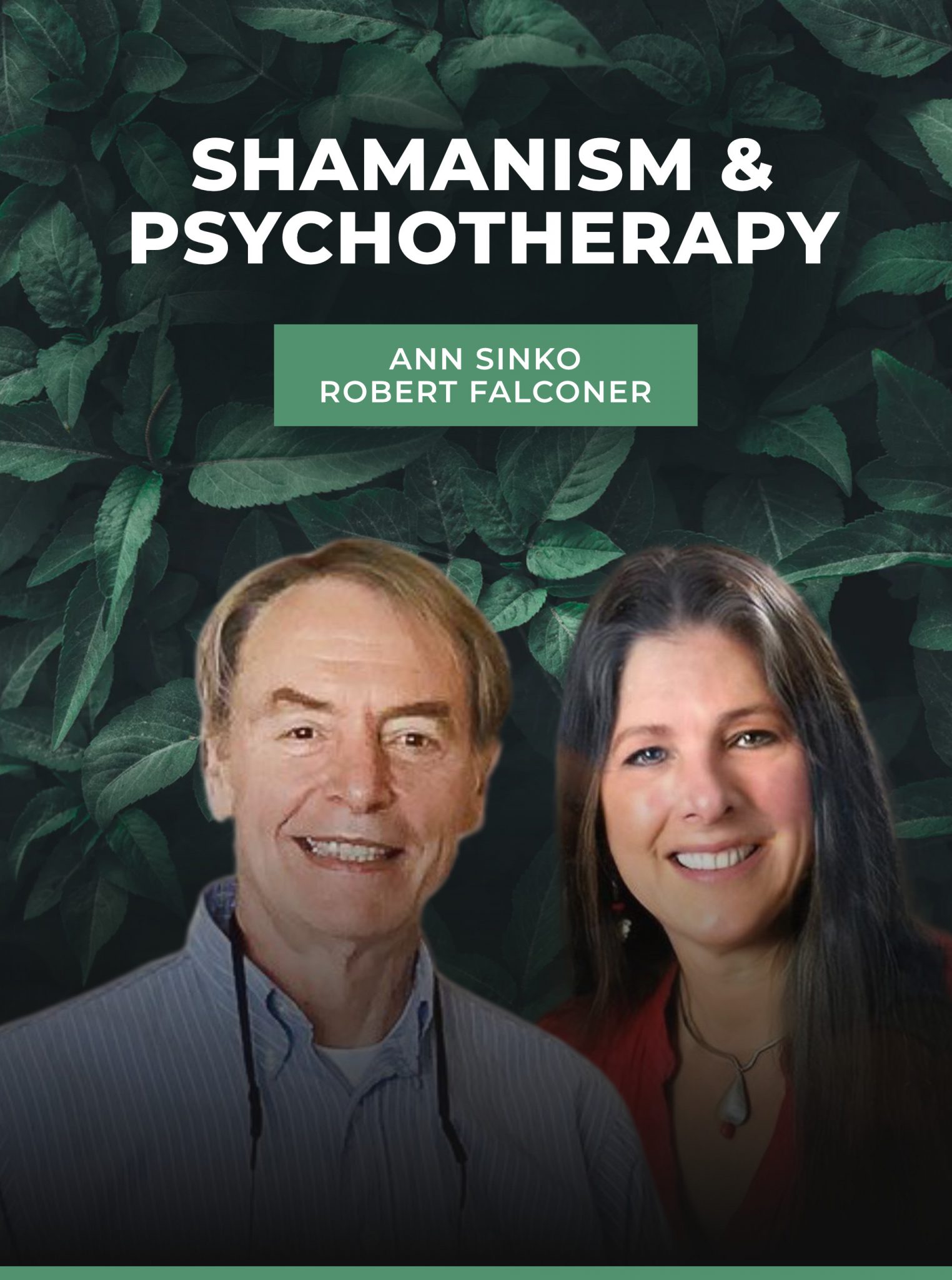
Shamanism & Psychotherapy
In recent times the practice of psychotherapy has seen the benefit of the inclusion of spirituality for client and therapist alike. Shamanism has much to teach about the process of healing and empowerment. The goals of both practices are very similar – applying techniques that achieve and maintain well-being and healing and to help alleviate suffering. As well as helping our clients transcend their limited definition of themselves and their world.
A basic tenant of shamanism is that one’s personal power is fundamental to wellbeing. As is having self esteem, self compassion, a sense of agency and belonging in psychotherapy.
During “Shamanism & Psychotherapy” you will:
- Learn the foundational components of shamanism and how they relate to the process of psychotherapy.
- Explore the concept of guides/guidance and how to enhance and apply these concepts/relationships, personally and professionally.
- Learn how to identify legacy burdens and unattached burdens and other energies that don’t belong.
- Gain knowledge about the universals of shamanism put forth by Michael Harner.
- Learn the benefits of having a relationship with guidance.

IFS and the Polyvagal Theory
Despite the diversity of content that brings clients to therapy, difficulty regulating their emotional experience is at the heart of their struggles. Clients can feel hijacked by extreme emotional states, uncomfortable in their own skin, and think or behave in ways they wish they wouldn’t. Polyvagal Theory (PVT) helps us understand what is happening on a biological level when our clients are emotionally dysregulated or stuck in adaptive survival states, such as fight, flight, freeze, or numb.
During “IFS and the Polyvagal Theory” you will:
- Understand how IFS works in concert with the nervous system to promote healing and transformation.
- Learn how an understanding of Polyvagal Theory can help therapists and practitioners implement IFS more safely and effectively, especially in the systems of clients with complex trauma.
- Explore, through didactic segments paired with observation and discussion of real video examples, how to seamlessly integrate IFS and PVT in treatment.
- Describe the main principles of Polyvagal Theory most relevant to clinical work, and how PVT can inform and enhance application of IFS.
- Translate Polyvagal principles into IFS language and describe how they can be understood through an IFS lens.

The Gifts of Our Exiles in IFS
The protective parts of us see our exiles as dangerous, shameful, too intense, or too fragile. One of the keys to healing is helping the client’s protective system differentiate between the exile’s burdens and its true nature, which has gotten obscured. When we help the client and their protectors recognize the exile’s gifts, it can ease their resistance to connecting with exiles and allow space for healing to take place.
During “The Gifts of Our Exiles in IFS” you will:
- Identify the three different kinds of gifts exiles offer and learn how to recognize them during the healing process.
- Understand how the individual’s True Self fits with the Universal Self in the IFS model, and why this connection is vital for healing.
- Explore the three shifts of identity that can occur in healing, and strategies for integrating these ideas at different stages of the work.
- Use direct access with protectors and help clients retrieve positive experiences of having been seen and cared for, including creating an inner healing circle and reflecting back qualities of the exile.
- Focus on the exile’s gifts during invitation and integration, and help the client’s protective system differentiate between the exile and its burden to deepen the healing process.

Daily Parts Meditation Practice®
Daily Parts Meditation Practice® (DPMP®) for Therapists and Practitioners is a set of six essential IFS integration tools. It contains tools to be used between IFS sessions, both for clients and for therapists: DPMP® Meditation, Parts Externalizations, Parts Catalogue Cards, Parts Biographies, Parts Timelines and Parts Maps.
During “Daily Parts Meditation Practice® for Therapists” you will:
- Learn the benefits of having a regular parts meditation practice.
- Design your unique personalized Daily Parts Meditation for ongoing Self-to-part relationships to support your IFS journey.
- Experience multiple DPMP® meditations throughout the course to get a felt sense of the practice.
- Learn the benefits of Parts Externalizations and ways of doing so for your system.
- Learn about Parts Timelines of IFS sessions to track parts through therapy for yourself and your clients.
- Discover Parts Maps (both session-only and full-system maps) to track parts through therapy for yourself and your clients.
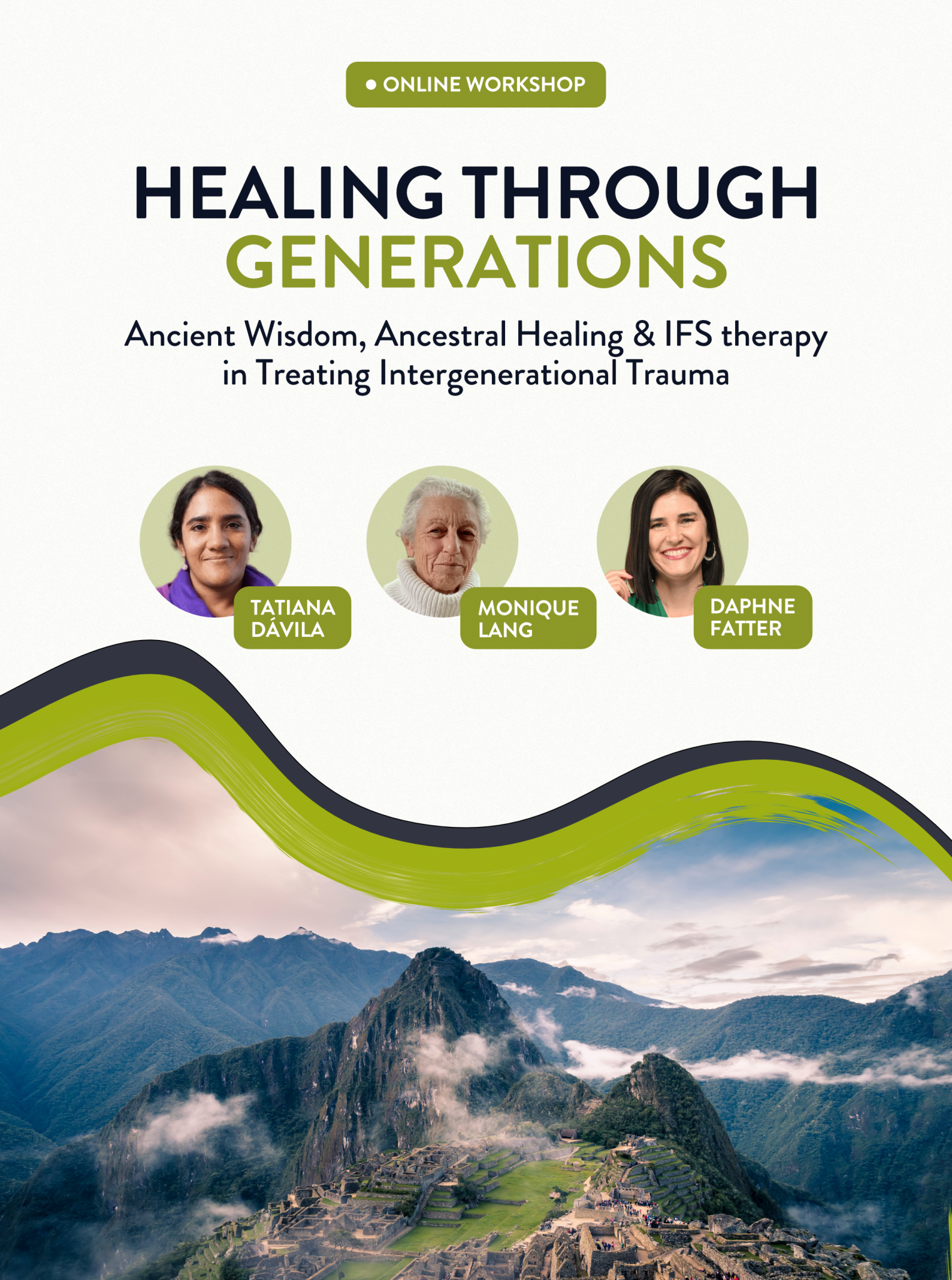
Healing Through Generations Ancient Wisdom, Ancestral Healing and IFS
So much of what we carry in our bodies and minds is not ours. If we like it or not, we are containers for what our ancestors have experienced. Intergenerational trauma, also known as generational or ancestral trauma, refers to the transmission of psychological and emotional wounds from one generation to another. This concept suggests that the trauma experienced by individuals or communities can have lasting effects that impact subsequent generations, even if those later generations didn’t directly experience the traumatic events themselves.
During “Healing Through Generations: Ancient Wisdom, Ancestral Healing and IFS ”:
- Daphne Fatter, a Certified IFS therapist, will introduce IFS therapy with the Legacy Burdens protocol, which was designed to deal with emotional burdens that are not ours. Then, she will present the Ancestral Healing modality.
- Tatiana Dávila, a Gestalt therapist from Ecuador, will share how ancestral wisdom that comes from the Andes.
Monique Lang will introduce her Earth-Based Psychotherapy – an attempt to weave together the practices of indigenous people with modern psychotherapy techniques.

Safe practices for working with Plant Teachers
In the heart of the Amazonian rainforest, a powerful and ancient plant thrives — a true guide to profound transformation. The Madre, a powerful and ancient Plant Teacher, has gained significant attention in recent years for its potential therapeutic benefits in treating mental health issues. This unique plant offers a deeply introspective experience, serving as a catalyst for profound healing. This workshop is designed exclusively for mental health professionals seeking to expand their therapeutic toolkit and explore the integration of Plant Teachers into their practice.
During “Safe practices for working with Plant Teachers” you will:
- Understand the importance of set and setting, intake, and multi-level preparation for safe plant teacher experiences.
- Learn how to apply the Internal Family Systems (IFS) model during both preparation and ceremonies.
- Gain insights into the ceremony process, the roles of guides, safety measures, and contraindications.
- Explore the crucial role of integration—starting before the ceremony, embracing the process, and involving community support.

Somatic Parts Work
In the realm of mental health, the integration of body-based approaches is a transformative step toward providing comprehensive and effective care. It can be a game-changer, particularly when helping clients navigate the intricate terrain of trauma and complex emotional states. This workshop series offers an experiential introduction to IFS therapy with a focus on somatic interventions.
During “Somatic Parts Work” you will:
- Be introduced to Internal Family Systems and learn about three types of parts: Managers, Firefighters, and Exiles.
- Learn about the concept of Self Energy.
- Experience the five leading practices of Somatic IFS: Awareness, Breath, Resonance, Movement, and Touch.
- Discover new ways to somatically attune inside to your own system, exploring access to an Embodied Self.

Completion of IFS Level 1 Training is not required
You don’t need to have completed IFS Level 1 Training to benefit from this bundle.At the same time, please note that we won’t be covering the basic didactics of the model — so a solid understanding of IFS fundamentals is important to fully engage with the material.
We recommend that you join if:
- You’ve taken part in a comprehensive introductory IFS course or the IFSI Online Circle,
- You’re interested in deepening your relationship with your own system.
Have Questions? We’ve Got Answers
If you’ve previously purchased one or more workshops that are included in the bundle, you’re still welcome to purchase the full bundle and enjoy access to the workshops you don’t yet own.
Please note that workshops included in the bundle cannot be exchanged, and we’re unable to offer refunds for workshops purchased individually prior to the bundle offer.
IFS CEs for select workshops in this bundle are available and can be applied toward IFS certification for those who have completed Level 1 training.
For detailed information about available IFS CEs, please refer to the individual workshop pages.
Yes! After completing each workshop, you’ll be able to generate a certificate confirming your participation directly from your user account.
Unfortunately, this offer is not available in an installment plan. However, you will have the option to purchase access to individual workshops.
No, access is limited to the workshops listed below:
- Transcending Trauma – Frank Anderson
- Somatic IFS – Susan McConnell
- IFS in Group Settings – Mary Kruger
- IFS & Psychedelics – Bob Falconer, Richard Schwartz, Robert M. Grant & Michael Mithoefer
- IFS Therapy: Therapeutic Relationship & Power of Presence – Paul Neustadt
- IFS is Grief Work: Healing Unattended Losses – Jory Agate
- Working With Highly Conflictual Couples – Mary Kruger
- Befriending Difficult Protectors – Mike Elkin
- IFS Therapy: A Spiritual and Energetic Approach – Kay Gardner
- Direct Access – An Essential IFS Skill – Fran Booth
- Effective Compassion: IFS Interventions for Healing Trauma and Addictive Cycles – Cece Sykes
- Self-led Sexuality – Patricia Rich
- The Others Within Us: Unattached Burdens and Guides in IFS Therapy – Bob Falconer
- Shamanism & Psychotherapy – Robert Falconer & Ann Sinko
- IFS and the Polyvagal Theory: Healing Through Compassion and Connection – Alexia Rothman
- The Gifts of Our Exiles in IFS – Paul Neustadt
- Daily Parts Meditation Practice for Therapists – Michelle Glass
- Healing Through Generations: Ancient Wisdom, Ancestral Healing and IFS Therapy – Daphne Fatter, Monique Lang & Tatiana Dávila
- Safe Practices for Working with Plant Teachers – Geke Dijkstra
- Somatic Parts Work – LaDonna Silva










